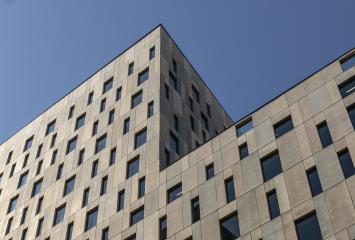The Influence of Ergonomic Furniture on Productivity
Are rigid chairs designed solely for aesthetic purposes and indifferent to the needs of the human body still prevalent in classic offices? Perhaps. However, in modern offices centered around the well-being of individuals, nothing is more important than the comfort of workers. This extends beyond just work chairs to include desks, sofas, armchairs, monitors, and keyboards. For a human-centric company, providing adjustable furniture is essential, allowing each professional to find their optimal working state based on the unique characteristics of their body. Customization is the key.
Genuine Ergonomic Furniture
"Ergonomic" has been a prominent term in furniture design over the last two decades, often used imprecisely. True ergonomic furniture is not about appearing comfortable at the expense of elegance, as some advertisements suggest. Instead, it empowers workers by providing adjustable mechanisms. For example, chairs that allow lumbar adjustment, height adjustment, seat angle adjustment, or armrest adjustment. Similarly, desks with various height options or keyboards that can be adjusted to fit the morphology of each wrist.
Even with comfort features, furniture cannot be truly ergonomic unless it can be personalized. After all, each worker is unique, with a distinct height, spine, gait distribution, mobility level, and flexibility. The contemporary office strives to create environments that allow individuals decision-making space, driven both by human empathy and the understanding that this autonomy leads to increased comfort, satisfaction, and ultimately, higher performance. The company also benefits.
Benefits of Ergonomic Furniture for the Company
Uncomfortable furniture can lead to injuries over time. Ergonomic furniture helps prevent mild and acute pain in body regions such as the back, neck, shoulders, or wrists. This, in turn, has two crucial implications for companies. Firstly, workers can more easily focus on their tasks, contributing more value to the company. Secondly, there is a reduction in sick leave due to incapacity. According to data from the Ministry of Health, "problems in the lumbar region currently account for 25% of sick leave in Spain."
However, the impact of ergonomic furniture goes beyond the individual worker's perception; it also affects the collective and societal views. Happy employees become brand advocates, increasing the interest of other professionals in joining the company and consumers in trusting its services and products. In a time where the well-being of workers is a crucial moral factor in purchasing decisions, companies that prioritize the physical and mental health of their employees have a significant advantage.
Moreover, the ergonomic design of furniture, electronic devices, and even the workspace itself creates a much healthier and emotionally gratifying environment. Stress is minimized, anxiety is reduced, and frustration is channeled more effectively because there is no perception of neglect by the company. Positive predisposition is significantly higher. Finally, despite not being a top priority, ergonomic furniture, being adjustable, translates into long-term cost savings for the company as it accommodates any new employee. There's every reason to invest in it.

